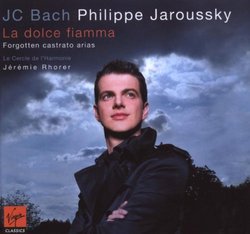| All Artists: Philippe Jaroussky Title: Bach J C: LA Dolce Fiamma Members Wishing: 0 Total Copies: 0 Label: EMI France Original Release Date: 1/1/2009 Re-Release Date: 11/10/2009 Album Type: Import Genres: International Music, Pop, Classical Styles: Vocal Pop, Opera & Classical Vocal Number of Discs: 1 SwapaCD Credits: 1 UPC: 5099968572600 |
Search - Philippe Jaroussky :: Bach J C: LA Dolce Fiamma
CD Details |
CD ReviewsA Real Treat Rossano Pestarino | Italy | 12/22/2009 (5 out of 5 stars) "A great treasure for every seria lover and a welcome set of beautiful pages of forgotten music from the XVIIIth century: one hour of pure joy and sheer pleasure, both vocally and instrumentally. Jaroussky always amazing (some occasional too "dry" high tenuto notes, but gorgeous singing and technique, as usual, more than often very impassioned). One wonders why such a composer and the whole repertoire of seria from the period---with too few exceptions---took so long to be "discovered" again. Could it be because if we go on this way this would necessarily lead (and about time!) to a redefinition, to say the least, of Mozart as an opera composer?" There's Already a Second Pressing, and it's Cheaper... Giordano Bruno | Wherever I am, I am. | 01/16/2010 (5 out of 5 stars) "...so check the listings carefully. Here's the review I wrote for the other release:
We Can't Really Know ... ... how good the famed castrati of 18th C music (Farinelli, Guadagni, Manzuoli, inter alia) really were -- whether they were as expressive, their voices as powerful, their breath control so vast that they could stretch an ornamented phrase across dozens of measures, beyond the lung capacity of any woman singer, as reported by contemporary listeners -- but if they were 'better' than our own male soprano Philippe Jaroussky, then I'm inflamed with envy at being born in the wrong age. But I'm willing to venture the opinion that no one ever has sung this repertoire, the arias and cantatas written for castrato superstars, more beautifully than Jaroussky. He transcends the usual limits of countertenor voices, not only in range but in flexibility of dynamics, with exactly the ability to sing expressively piano to forte, just the talent ascribed to the castrati for whom JC Bach composed many of his operatic roles. Jaroussky never sounds effortful or unnatural. His agility and suppleness in ornamental passages makes the most flamboyant excesses sound graceful and intrinsic to the affect of the music. His previous recital CD with Le Concert D'Astree -- "Carestini: the story of a castrato" -- cemented my opinion of him as the most virtuosic male soprano performing today, but this recording of arias all by the same composer, Johann Christian Bach, is ineluctably better. Part of its superiority comes from the tasteful instrumental support of the ensemble "Le Cercle de l'Harmonie", conducted by the very young Jérémie Rhorer. I have a suspicion that Jaroussky and Rhorer share interpretive instincts more closely than Jaroussky and Emmanuelle Haim, the director of Le Concert Astrée. But then, it could be that the music itself is superior. The 'Carestini' CD includes arias by seven magnificent composers -- Porpora, Capelli, Handel, Leo, Hasse, Gluck, and Graun -- while this CD features only compositions of the next generation, by Johann Christian Bach, the youngest son of Johann Sebastian Bach. So I have to venture another radical opinion: that JC Bach was a far finer composer than modern audiences have discovered. The arias recorded here are worthy of the voice. JC Bach (born in 1735) was exactly half a century younger than GF Handel, but he followed much the same career path, from Germany to Italy, where his early operatic successes in Turin marked him as the new prodigy. In 1762, he followed Handel's tracks to London. Both composers spent the rest of their lives in England, though Bach made important excursions to Germany and Austria. Bach can be credited with reviving English enthusiasm for Italian opera, at least for a few decades. Of all the musical Bachs - his father and his three brothers - JC was the only composer of operas. In fact, his operas were his chief efforts; though his chamber and orchestral compositions have received most of the attention of modern performers, JC Bach's true stature can only be recognized in his theatrical works. The sad fact is that his operas remain hideously neglected. Modern stagings are non-existant, and even studio recordings of complete operas are limited to two, one rare and one unavailable. The arias sung by Jaroussky on this CD come from Bach's operas La Clemenza di Scipione, Artaserse, Orfeo ed Euridice, Adriano in Siria, Carattaco, and Temistocle. The titles alone should reveal that Bach's interests were in opera seria, putting him in the class of the older Gluck and the younger Mozart. It's well documented that Mozart was patronized by Bach when the Austrian child prodigy visited London, and that Mozart regarded Bach as one of his prime models, from whom he could and did learn much. Purely on musical grounds, the arias recorded here suggest that reviving Bach's operas might be a major priority. In other words, the music is really, really good, better in many ways than any in Mozart's before Le Nozze di Figaro. How well Bach's operas would play on stage, I can't predict. Surely they couldn't be any more theatrically unpromising than many of Handel's, which have been revived. If a case for JC Bach needs to be made, I hope this spectacular performance, La Dolce Fiamma, by Philippe Jaroussky will open the proper ears." |

